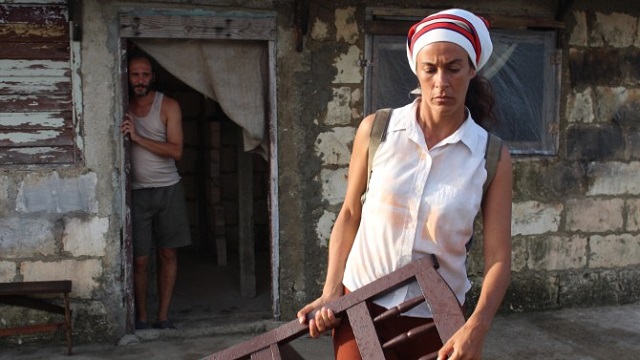Although I don’t consume as much foreign cinema as I should – I especially need to force myself out of my Western Europe/Eastern Asian predilections – one of the aspects about world cinema that I most appreciate is seeing a different culture other than my own. My main goal in selecting foreign cinema is to try to steer clear from poverty porn, that cinema where everybody is suffering, poor, and the main reason for distribution is to make Americans feel guilty about our wealth while appreciating what we have. On the one hand, I believe the glut of these films are meant to stereotype certain cultures to wring tears from a soft-hearted liberal audience, but, on the other, these cultures do exist and sometimes they have something political to say. The gay Cuban film Santa y Andres belongs to this poverty porn section that seeks to demonize the Castro dictatorship (and, by association, socialism) and has caused quite the political fuss over the past year.
Andres is a gay dissident writer living in an isolated shack after having been blacklisted by the Cuban government. But, this isn’t punishment enough for the political powers that be. When a group of journalists come together in their town, they send Santa, a stubborn political operative, to keep an eye on him and make sure he isn’t going to disrupt their activities. Yadda yadda yadda, they have stuff to learn from each other, you probably already know how this movie is going to go (especially when I tell you that Andres has a gay hookup because of course he does).
The movie has all the highlights of the political poverty porn genre. A government in decline struggling to reinforce its believers through any means necessary. Andres lives in a run down shack with wooden stools, metal sheets for walls, etc etc etc. They live on a farm. There are thin mattresses and worries about food and water. Santa y Andres is also one of the slowest and sleepiest movies that runs under two hours (its 105 minutes feels like 210). This is the type of movie that feels engineered toward bleeding heart American sympathies who want to pat themselves on the back for liking this movie about impoverished and persecuted gay Cubans.
Did things really happen like this on the regular? Obviously, the Cuban government, through has denied the situation, claiming that Carlos Luchega is “rewriting history” and these persecutions have never happened. Cuba’s film institute, the ICAIC, rejected Santa y Andres from the New Latin American Cinema film festival in Havana. The ICAIC also strongarmed New York’s Havana Film Festival into moving Santa y Andres out of competition into “Special Presentation” (after which, Luchega pulled his film entirely). Luchega, for his part, hasn’t said whether the story is based in reality or fiction, but has asserted that his film is being politically persecuted. Besides, the story of Santa y Andres is based in the lives of blacklisted or exiled gay Cuban authors like Delfin Prats and Reinaldo Arenas (Before Night Falls).
Though the movie needs to be cut by at least 15 minutes (the theme of SIFF 2017 is that almost all of the movies were at least 15-20 minutes too long), Santa y Andres has an elegance to it that simultaneously enhances and betrays my earlier pat categorization. In my books, anything that has enough subtle power to cause an uproar among a government should be required viewing. But, it’s also a hard sit because the beats feel so familiar and formulaic that its fictional status seems obvious and rote. These movies where the political importance may outweigh the craft feels like a perfect example of what is derogatorily called “eating your vegetables.”

